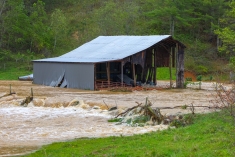Solutions to Catastrophe Insurance Post-Hurricanes

Hurricane season may be winding down, but efforts to rebuild following back-to-back Hurricanes Helene and Milton are just starting to ramp up across the Southeast US. As a result, the topic of insurance is once again top of mind as residents, first responders, and lawmakers assess billions of dollars in damage and chart a path forward.
Distinguished Professor Emeritus Jay M. Feinman, co-director of the Center for Risk and Responsibility (CRR) at Rutgers Law School, is contributing to this ongoing discussion with a newly published paper, “Designing Public Solutions to Catastrophe Insurance Market Failures.” In this Q&A, Feinman breaks down the significant challenges facing both insurers and residents and the importance of asking the tough questions.
What are the biggest issues surrounding disaster insurance that lawmakers and private insurance providers should be examining?
The biggest issue is that most homeowners don’t have the right insurance or enough insurance to cover their losses. Ordinary homeowners’ insurance doesn’t cover flood damage, for example, but according to The Wall Street Journal, 19 out of 20 of homes in Hurricane Helene’s path across Florida’s Big Bend lacked federal flood insurance. As losses grow, insurance companies are cutting back on coverage in ways big and small, increasing deductibles, raising premiums, and even pulling out of many insurance markets altogether.
The lack of coverage matters to individuals, of course, because they won’t have the resources to rebuild their homes. It matters to the economy and society as a whole, too. Without insurance as a backstop, entire communities can be wiped out, regional economies undermined, and social ties severed.
Why is this an important issue right now?
Climate change is increasing the frequency and severity of catastrophes, so more property owners are subject to more serious losses. In 2023, for example, there were 22 natural disasters with more than a billion dollars in losses each, the most ever in a single year. It’s a national problem—hurricanes in Florida, hailstorms in Minnesota, wildfires in California, even the massive rainstorms of Hurricane Helene in Asheville, North Carolina, 300 miles from the coast.
Why haven't these insurance challenges been adequately addressed thus far?

Politics, of course. People generally don’t pay much attention to insurance until something bad happens. After a catastrophe, interest and activity surges in Congress, state legislatures, and among regulators. Conflicting interests rise up—consumers and the insurance industry, state and federal governments, regulators with varying perspectives—arguing about how insurance premiums should be set, whether the government should supplement the private market, and who should pay for what. Sometimes changes are made, even more rarely compromise is achieved, but more often things stalemate and interest dies down, at least until the next catastrophe.
What needs to happen for people to get the coverage and support they need?
To fix this problem, we first need to ask the right questions. (I’ve outlined the questions in my recent paper.) There are tough choices to be made. If insurance premiums need to increase sharply to cover disaster losses, what if existing homeowners can’t afford to pay? What happens when individual property owners can’t pay to rebuild and the recovery of entire communities is in jeopardy? Insurance mostly is regulated at the state level, but should the federal government play a bigger role, as it does with flood insurance? Put more broadly, is protection against loss an individual responsibility or a shared responsibility?
What can the average person do to address this issue?
People should first check their own insurance policies. Think of all the types of large losses that could happen, even if they are unlikely, and see if your homeowner’s policy would cover them. If it doesn’t, check with your insurance company to see if broader coverage is available and if you want to pay for it. At least some of the answers to those questions likely will be unsatisfactory, so if you want to press further, check with your state insurance department or legislators and see if they are thinking about these problems. There are no easy answers, but ignoring the problem only will make things worse.
Click here to access CRR's RUInsure Score tool and other homeowners' insurance projects.